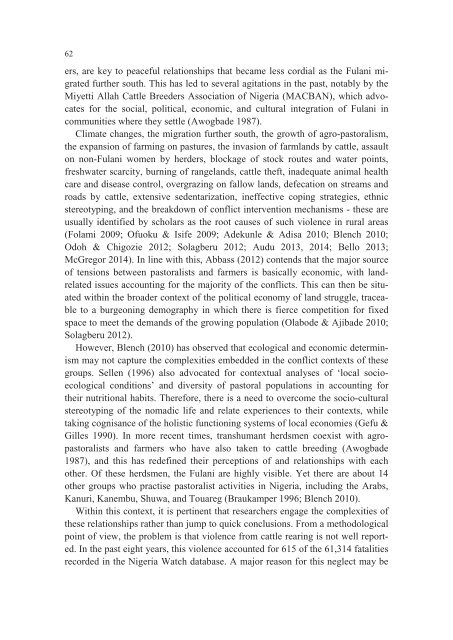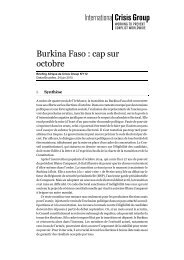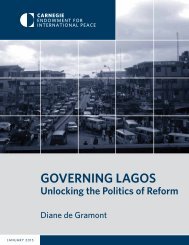Violence in Nigeria
ASC-075287668-3743-01
ASC-075287668-3743-01
Create successful ePaper yourself
Turn your PDF publications into a flip-book with our unique Google optimized e-Paper software.
62<br />
ers, are key to peaceful relationships that became less cordial as the Fulani migrated<br />
further south. This has led to several agitations <strong>in</strong> the past, notably by the<br />
Miyetti Allah Cattle Breeders Association of <strong>Nigeria</strong> (MACBAN), which advocates<br />
for the social, political, economic, and cultural <strong>in</strong>tegration of Fulani <strong>in</strong><br />
communities where they settle (Awogbade 1987).<br />
Climate changes, the migration further south, the growth of agro-pastoralism,<br />
the expansion of farm<strong>in</strong>g on pastures, the <strong>in</strong>vasion of farmlands by cattle, assault<br />
on non-Fulani women by herders, blockage of stock routes and water po<strong>in</strong>ts,<br />
freshwater scarcity, burn<strong>in</strong>g of rangelands, cattle theft, <strong>in</strong>adequate animal health<br />
care and disease control, overgraz<strong>in</strong>g on fallow lands, defecation on streams and<br />
roads by cattle, extensive sedentarization, <strong>in</strong>effective cop<strong>in</strong>g strategies, ethnic<br />
stereotyp<strong>in</strong>g, and the breakdown of conflict <strong>in</strong>tervention mechanisms - these are<br />
usually identified by scholars as the root causes of such violence <strong>in</strong> rural areas<br />
(Folami 2009; Ofuoku & Isife 2009; Adekunle & Adisa 2010; Blench 2010;<br />
Odoh & Chigozie 2012; Solagberu 2012; Audu 2013, 2014; Bello 2013;<br />
McGregor 2014). In l<strong>in</strong>e with this, Abbass (2012) contends that the major source<br />
of tensions between pastoralists and farmers is basically economic, with landrelated<br />
issues account<strong>in</strong>g for the majority of the conflicts. This can then be situated<br />
with<strong>in</strong> the broader context of the political economy of land struggle, traceable<br />
to a burgeon<strong>in</strong>g demography <strong>in</strong> which there is fierce competition for fixed<br />
space to meet the demands of the grow<strong>in</strong>g population (Olabode & Ajibade 2010;<br />
Solagberu 2012).<br />
However, Blench (2010) has observed that ecological and economic determ<strong>in</strong>ism<br />
may not capture the complexities embedded <strong>in</strong> the conflict contexts of these<br />
groups. Sellen (1996) also advocated for contextual analyses of ‘local socioecological<br />
conditions’ and diversity of pastoral populations <strong>in</strong> account<strong>in</strong>g for<br />
their nutritional habits. Therefore, there is a need to overcome the socio-cultural<br />
stereotyp<strong>in</strong>g of the nomadic life and relate experiences to their contexts, while<br />
tak<strong>in</strong>g cognisance of the holistic function<strong>in</strong>g systems of local economies (Gefu &<br />
Gilles 1990). In more recent times, transhumant herdsmen coexist with agropastoralists<br />
and farmers who have also taken to cattle breed<strong>in</strong>g (Awogbade<br />
1987), and this has redef<strong>in</strong>ed their perceptions of and relationships with each<br />
other. Of these herdsmen, the Fulani are highly visible. Yet there are about 14<br />
other groups who practise pastoralist activities <strong>in</strong> <strong>Nigeria</strong>, <strong>in</strong>clud<strong>in</strong>g the Arabs,<br />
Kanuri, Kanembu, Shuwa, and Touareg (Braukamper 1996; Blench 2010).<br />
With<strong>in</strong> this context, it is pert<strong>in</strong>ent that researchers engage the complexities of<br />
these relationships rather than jump to quick conclusions. From a methodological<br />
po<strong>in</strong>t of view, the problem is that violence from cattle rear<strong>in</strong>g is not well reported.<br />
In the past eight years, this violence accounted for 615 of the 61,314 fatalities<br />
recorded <strong>in</strong> the <strong>Nigeria</strong> Watch database. A major reason for this neglect may be






